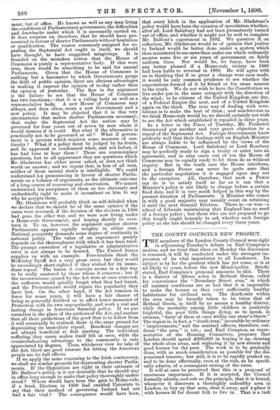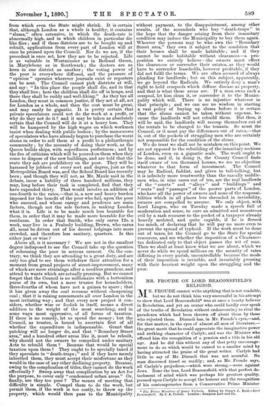THE COUNTY COUNCIL'S NEW PROJECT. T HE members of the London
County Council were right in adjourning Tuesday's debate on Earl Compton's motion, and we trust that when on Monday the discussion is resumed, it will be conducted under the strongest im- pression of its vital importance to all Londoners. Its subject is by far the greatest which has yet come, or is at all likely to come, before the new Municipality. Briefly stated, Earl Compton's proposal amounts to this. There is a district of fifteen acres in Bethnal Green, called for convenience the " Boundary Street area," in which all sanitary conditions are so bad that it is impossible to make the houses as they exist sufficiently healthy habitations for civilised men. The death-rate within the area may be broadly taken to be twice that of Bethnal Green, in itself by no means a healthy district, while the mortality among little children is positively frightful, the poor little things dying, so to speak, in swarms, " forty of them at once within one stone's-throw." The region is, in fact, a " death-trap," incurable by ordinary " improvements," and the sanitary officers, therefore, con- demn " the area " in toto ; and Earl Compton, as repre- sentative of the Housing Committee, proposes that London should spend -Q300,000 in buying it up, clearing the whole slum away, and replacing it by new streets and good houses for the poor. The work is to be gradually done, with as much consideration as possible for the dis- possessed tenants ; but still, it is to be rapidly pushed on, and to be done effectually, even at the risk, as he specifi- cally admits, of a consequent raising of the rates. It will at once be perceived that this is a proposal of enormous importance. If it is accepted, the Council formally admits, and acts on the principle, that it is bound, whenever it discovers a thoroughly unhealthy area in London, to buy up that area, clear it away, and replace it with houses fit for decent folk to live in. _ That is a task from which even the State might shrink. It is certain that, although London as a whole is healthy, it contains " slums," often extensive, in which the death-rate is abnormally high, and in which children in particular die like flies ; and if these districts are to be bought up and rebuilt, applications from every part of London will at once be pressed upon the Council. Nor do we see, if the precedent is once set, how they are to be rejected. Life is as valuable in Westminster as in Bethnal Green, in .Marylebone as in Southwark ; the doctors are as keen in one district as another ; the voting power of the poor is everywhere diffused, and the pressure of " opinion " operates wherever journals exist or reporters can be sent. The. Council cannot pick districts at will, and say : " In this place the people shall die, and in that they shall live ; here the children shall die off in heaps, and there they shall be ruddy and well-liking." As they tax all London, they must in common justice, if they act at all, act for London as a whole, and then the cost must be great, and may easily be gigantic. It is pretty certain that private speculators could not do the work at a profit, or why do they not do it ? and it may be taken as absolutely certain that the Council will do it at a heavy loss. They will be hampered by the high wages on which workmen insist when dealing with public bodies ; by the manoeuvres of speculators who have already begun to purchase the worst slums in order to sell them at a profit to a philanthropic community ; by the necessity of doing their work, as the Queen builds ships, with superfluous perfectness ; and by the fire of criticism which will be poured on them when they come to dispose of the new buildings, and are told that the rents they ask are prohibitory on the poor. They will be harassed by jobbers of every sort and degree, just as the Metropolitan Board was, and the School Board has recently been ; and though they will not, as Mr. Maule said in the debate, incur a liability of three hundred millions, they may, long before their task is completed, find that they have expended thirty. That would involve an addition of one-fourth to the rates,—that is, a new and heavy burden imposed for the benefit of the poor who fail, upon the poor who succeed, and whose energy and prudence are main factors, though not the sole factors, in making London what it is. Life is to be made much less bearable for them, in order that it may be made more bearable for the residuum. In order that Smith, who only earns 12s. a week, may live in a Peabody building, Brown, who earns £1, must be driven out of his decent lodgings into more crowded, and therefore less sanitary, quarters. Is this either just or wise ?
Above all, is it necessary ? We are not in the smallest degree indisposed to see the Council take up the question of rehousing the poor in serious earnest. On the con- trary, we think they are attending to a great duty, and are only too glad to see them withdraw their attention for a moment from grand projects of street-improvement, many of which are mere strainings after a needless grandeur, and attend to wants which are actually pressing. But we cannot forget that the Council is no millionaire with a bottomless purse of its own, but a mere trustee for householders, three-fourths of whom have not a guinea to spare ; that it has given away the coal revenue without cheapening coal ; that it is raising assessments all over London in the most irritating way ; and that every new project it con- siders, whether wise or foolish in itself, means a direct addition to the weight of the most searching, and in some ways most oppressive, of all forms of taxation. If there is no remedy, let us spend the money ; but the Council, as trustee, is bound to ascertain first of all whether the expenditure is indispensable. Grant that patching will no longer do, and that " Boundary Street area," and a hundred other areas like it, must be rebuilt, why should not the owners be compelled under sanitary Acts to rebuild them ? Because that would be special taxation upon them ? They ought to be specially taxed if they speculate in " death-traps ;" and if they have merely inherited them, they must accept their misfortune as they would in the case of any other declining property. Because, owing to the complication of titles, they cannot do the work effectually ? Sweep away that complication by an Act for the purpose, to cover only " condemned urban areas." Or, finally, are they too poor ? The means of meeting that difficulty is simple. Compel them to do the work, but permit them, if the work is too costly, to throw up the property, which would then pass to the Municipality without payment, to the disappointment, among other results, of the scoundrels who buy " death-traps " in the hope that the danger arising from their insanitary condition may induce the Municipality to buy them again. Whoever the persons may be who own the " Boundary Street area," they own it subject to the condition that their houses shall be made habitable ; and if they cannot be made habitable without clearances—a pro- position we entirely believe—the owners must effect the clearances or surrender their estates, as they would have to surrender leaseholds, however profitable, if they did not fulfil the terms. We are often accused of always pleading for landlords ; but on this subject, apparently, we go beyond the Radicals. We entirely deny a man's right to hold cesspools which diffuse disease as property, and that is what these areas are. If a man owns such a cesspool, let him clean it, or surrender it to the Munici- pality which will. There is no injustice whatever in that principle ; and we can see no wisdom in starting a vast policy of buying up slums before it is certain that the slums cannot be taken without expense, be- cause the landlords will not rebuild them. But then, it will be said, the landlords will recoup themselves out of the rentals to be charged to the tenants. So must the Council, or it must pay the differences out of rates,—that is, out of the pockets of struggling men who are certainly not responsible for the condition of the slums. We do trust we shall not be mistaken on this point. We are not opposed to the rebuilding of the insanitary sections of London, even on a gigantic scale. The work ought to be done, and if, in doing it, the County Council finds itself owner of ten thousand houses, we see no objection whatever to that form of investment. The Council may be Radical, faddist, and given to tall-talking, but it is infinitely more trustworthy than the rascally middle- men who, in nine cases out of ten, are the real landlords of the " courts " and " alleys " and " buildings " and " rents " and " passages " of the poorer parts of London, who have all the power of owners and none of the responsi- bilities which in all places less shrouded in invisibility, owners are compelled to assume. We only object, with Lord Lingen, who on Tuesday made a speech full of moderation and sense, to cure an admitted and monstrous evil by a rash recourse to the pocket of a taxpayer already heavily mulcted, and quite capable, if he is fleeced too much, of declaring that he will pay no more even to prevent the spread of typhoid. If the work must be done out of taxes, let the Council go to the State for special resources, and see whether the imposition of a Clearance- tax dedicated only to that object passes the wit of man. Then we shall at least know what we are about, which we never do while we spend millions on the security of rates differing in every parish, uncontrollable because the mode of their imposition is invisible, and invariably pressing with their heaviest weight upon the struggling and the poor.



















































 Previous page
Previous page